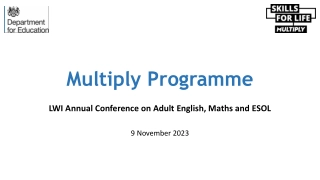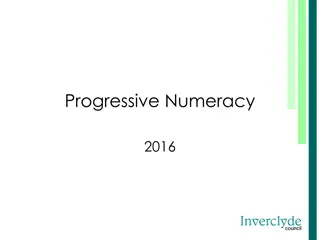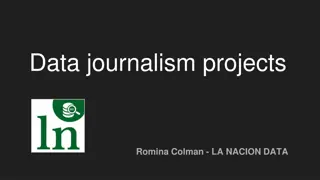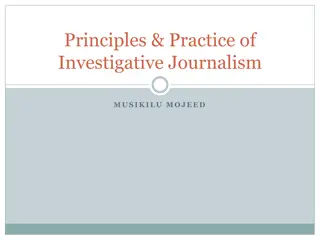The Importance of Numeracy in Journalism
Journalists need to have strong math skills to effectively report on stories involving numbers and statistics. Being innumerate can lead to inaccuracies, misunderstandings, and a lack of critical analysis in reporting. Understanding numbers is crucial for interpreting data, budgets, and various economic indicators accurately, ensuring reliable news coverage for audiences.
Download Presentation

Please find below an Image/Link to download the presentation.
The content on the website is provided AS IS for your information and personal use only. It may not be sold, licensed, or shared on other websites without obtaining consent from the author. Download presentation by click this link. If you encounter any issues during the download, it is possible that the publisher has removed the file from their server.
E N D
Presentation Transcript
Dealing with numbers Dealing with numbers Prof. Nixon K. Kariithi Tangaza Africa Media, Johannesburg University of Pretoria, Pretoria
A crisis of numbers A crisis of numbers The dearth of math skills among journalists is so well known that many people in the profession joke that they chose the field in order to avoid math. -- Missouri Group, News Reporting and Writing Aversion of all things numerical seems universal among journalists, and it causes nothing but trouble in today s newsrooms. Simply put, journalists need math skills to make sense of numbers the way they need language skills to make sense of words. - Deborah Potter, Poynter Institute, USA.
A crisis of numbers A crisis of numbers You may have thought that you went into journalism because you re not good at math but you like writing. If you were good at math you would have gone into engineering, computers, medicine or science. But journalism is about words, a haven for the literate. Wrong. You need math skills. How can such reporters write sensibly about trade and welfare and crime, or airfares, health care and nutrition? The media s sloppy use of numbers about the incidence of accidents or disease frightens people and leaves them vulnerable to journalistic hype, political demagoguery and commercial fraud. -- Christopher Scanlan Reporting and Writing: Basics for the 21st Century,
Why do numbers matter? Why do numbers matter? Numbers are themselves part of the story. Numbers are themselves part of the story. Example: Example: National budgets are not just about political ideology and power. They are also about sharing scarce national economic resources, and maintaining a enduring sense of continuity. Journalists who capture the budget s political rhetoric without interrogating the numbers miss the grand story of how economies and countries maintain, sustain and reproduce themselves.
Why do numbers matter? Why do numbers matter? Innumerate journalists approach major stories from positions of weakness and inability. When news sources discuss numbers, innumerate journalists get baffled and often cringe. Innumerate journalists are ineffective. They are highly prone to making gross mistakes in interpreting news. Innumerate journalists waste much precious time between deadlines trying to figure things out. Innumerate journalists end up regurgitating statistics without any critical examination because they are incapable of interpreting them. What rigour or watchdog role can we expect from such reporting? What service for media audiences and our societies? What future for our democracies?
Why do numbers matter? Why do numbers matter? Facts and numbers drive business, economics and finance. Example: private sector output, economic growth and development data, lending and borrowing from the international financial sector, international trade, securities trading, household spending, etc. If these facts and numbers drive the economy, they must also drive economics journalism. Reports lacking relevant economic data are incomplete and meaningless. It is unacceptable that reporters and editors lack skills to handle the large volumes of numbers involved in economics stories. Even worse is the attitude to Just put the data in there! It overwhelms audiences with huge, unprocessed numbers.
Why do numbers matter? Why do numbers matter? Journalists carry on dumping numbers on their readers laps because the feeling seems to be that a few percentages give the story a backbone of authority and authenticity. Unfortunately, most of the readers, not being at home with the numbers either, simply pass them over. -- Nicholas Bagnall s Newspaper Language Reporters and editors are suckers for numbers. To them, a number looks solid, factual, more trustworthy than a fallible human source. And being numerically incompetent, they can t find flaws in statistics and calculations. They can t tell the difference between a meaningless number and a significant one. The result is stories that are misleading and confusing at best and, at worst, flat out wrong. -- Deborah Potter, Poynter Institute, USA.
Why do numbers matter? Why do numbers matter? Numbers matter because they underpin the trends that all journalists so desperately seek to unearth and report. If accurately interpreted, they illuminate deeper issues that are not always readily presented by the news sources. Example: Changes in budget figures reflect changing priorities in government, agencies and even in entire cultures. Per capita spending often tells a more accurate story of funding levels than total budgets do. Percentages and percentage changes reflect proportions. Averages and medians can sometimes reflect important comparisons and contrasts behind issues in the news.
Warning about numbers Warning about numbers No matter how rigorous your analysis, numbers are not the story. Words, not data, make a story! Your analysis will shape the story; it is the story s foundation. Tell your story in a way that connects with people who don t know any statistics, i.e., telling the story without any technical data analysis. Avoid jargon. shortfall decline difference request remainder shortage unpaid bill unmet budget debt deficit
Tips on dealing with numbers Tips on dealing with numbers Round off and substitute. . Economists and financial experts need exact numbers, but your audiences do not. Poor: Small business owe the Windhoek Council $2,286,879.08 in tax arrears and related charges. Better: Small business owe the Windhoek Council $2,3 million in tax arrears and related charges. Tips: Profits doubled, NOT increased 105 percent. One in three executives in Namibia are overpaid. NOT 33% of the executives in Namibia receive way too much pay.
Tips on dealing with numbers Tips on dealing with numbers Use figures for numerals from 11 upwards, and for all numerals that include a decimal point or a fraction (e.g. 4.25). Use words for simple numerals from one to ten, except: In percentages (e.g. 4%) In sets of numerals, some of which are higher than ten. E.g. Bankruptcies over the past three months were 14, 9 and 6. Fractions should be hyphenated (one-half, three-quarters, etc) and spelled out in words, even when the figures are higher than ten, E.g. The group put one-tenth of the income in unit trusts, a twentieth in stocks and a thirtieth in a savings account. Write in an open, readable way. Always ensure that even the non-expert readers understand your reports. Example: $5 billion may be understood differently by various groups of readers, depending on their level of comprehension and interest.
Tips on dealing with numbers Tips on dealing with numbers Study the data closely. Identify that which is key to your report s central thrust. Note: Of course, it is tough to throw away data that you have so painfully gathered. However, the unacceptable alternative is a report cluttered with irrelevant facts and numbers. Put the facts and numbers in language and context that explain their importance and meaning to your readers. E.g. What is 0.5% in your audience s context? What is $1 billion? Place your facts carefully. Feed facts and numbers to your audiences quickly enough to maintain their interest. Yet, you should not be too fast or offer data in big bunches; you will choke them to death! Note: We may have facts and numbers important to many groups of people, but we should emphasise those that are meaningful to the largest audience. Meaning here equals impact, proximity, conflict and prominence. Putting numbers in context equals translating them for your audience.
Tips on dealing with numbers Tips on dealing with numbers Assist readers by providing a comparative context. Direct comparison of numbers with others aids readers comprehension. Compare to something people can relate to, such as another time, an earlier year, or another place. Example: Example: Profits before tax rose 39 percent to $551 million from $396 million last year. Always highlight the impact. Remember that audiences are searching the facts in your report for meaning and relevance to their family finances, companies, etc. Behind all numbers lurks meaning for real human beings. A number seldom will strengthen your report unless you can show how it affects life. When you do use a figure in a story, put it in context by comparing it to something else. A number has little significance on its own; its true meaning comes from its relative value. -- Paul Hemp, Ten Practical Tips for Business and Economic Reporting in Developing Economies.
Tips on dealing with numbers Tips on dealing with numbers Compare only true comparables. Don t compare apples and oranges. Compare similar businesses, same periods, adjusted numbers (real), and net items (excluding special items). Also, watch out for changes in the financial (fiscal) year. Be consistent in style. Use percent or % but do not interchange. Use fractions or decimal points exclusively. Note: A fall from 4% to 2% is a drop of two percentage points, or of 50%, but not of 2%.























